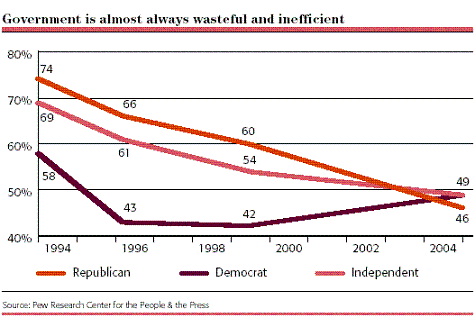This is a fascinating chart from the Pew Research Center’s “Trends” report.
Once upon a time, a Democrat was someone who believed that most existing government programs were worthwhile. A Republican was someone who thought that most government programs were a waste of money. There is now no difference between the parties on this question, although Democrats are slightly more likely to view federal programs as wasteful.
I suspect that Republican voters became more positive about government after the Clinton-era welfare reform, which ended the traditional federal subsidy to poor women with children. Perhaps they became even more positive once their party ran the government, and the most conspicuous federal programs became the “war on terror” and the invasion of Iraq (plus Social Security and Medicare)–all of which they support.
Conversely, Democratic voters don’t like the administration’s foreign policy adventures or the people in charge of them, and that may be part of the reason that they see government as wasteful. But here’s an additional hypothesis that would help explain the current weakness of the left. Many Democrats have come to see existing government programs–including welfare, education, health, and housing initiatives–as wasteful. This suspicion has a profound effect on politics; it means that a Democratic candidate cannot whole-heartedly or passionately advocate a different position from the Republicans’. Even his or her core constituency doesn’t believe that government programs really get good results. The best that Democrats can do is what Kerry did in ’04: talk vaguely about the need for health care reform, knowing pretty well than any particular legislation is dead on arrival. All that’s left is the ethical commitment to universal health insurance without any confidence that it can be achieved.
I see two main responses: (1) Democrats and liberals are simply demoralized, led into pessimism and cyncism by years of anti-state propaganda. They need to snap out of it–not just the leadership, but also the voters. Or (2) existing federal programs have a record of wastefulness and damage that has become too hard to ignore. We just can’t overlook farm subisidies, huge prisons, urban neighborhoods bulldozed by HUD, and even large school systems like the one my kid is in, with high per-pupil spending but insufficient money trickling down to classrooms. Furthermore, no one has shown us how federal money might solve problems like rust-belt unemployment, high crime and incarceration, or global poverty.
If (2) is true, the Democrats aren’t going anywhere until they develop bold and persuasive plans for reforming government.

You suggested that “Democrats don’t like the administration’s foreign policy adventures or the people in charge of them,” but of course Democrats don’t like the administration’s wasteful domestic policies either. Farm subsidies cut across party lines, but Democrats oppose the big government Medicare drug bill and probably No Child Left Behind as well. Perhaps Democrats are more likely to view the government as wasteful now because the government is, to a Democrat’s eye, more wasteful now.
That is, I think the change can be explained by the government’s new programs, and doesn’t necessarily relate to the government’s old programs (as efficient or wasteful as they may be). After all, the new stuff is what gets media play, what people discuss, and what’s on everyone’s mind when they think of government programs.
Minor note: Do you really think people consider high crime rates to be such an unsolveable problem, considering how much crime has dropped over the past 15 years?
These are all good points from “Anonymous.” I think this would be my response to his or her last question: Crime has fallen, perhaps as a response to various government policies, and that should inspire confidence in the state. However, we have the highest incarceration rate in the developed world, by far. All those prisons represent a gigantic human tragedy and waste. If massive incarceration is a reason for the fall in crime, then we have addressed one social problem by creating another one. If the high incarceration rate is unecessary, then it’s a classic case of wasteful and damaging government. Reducing crime without locking up literally millions of human beings would be real success.